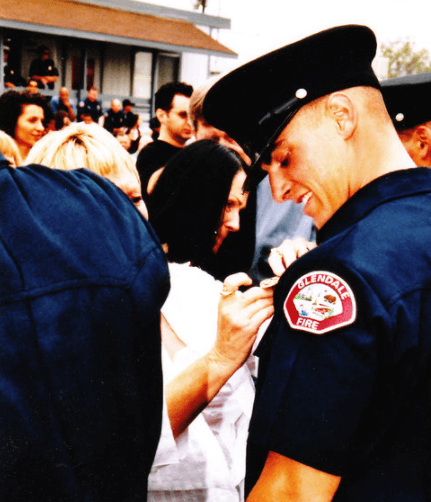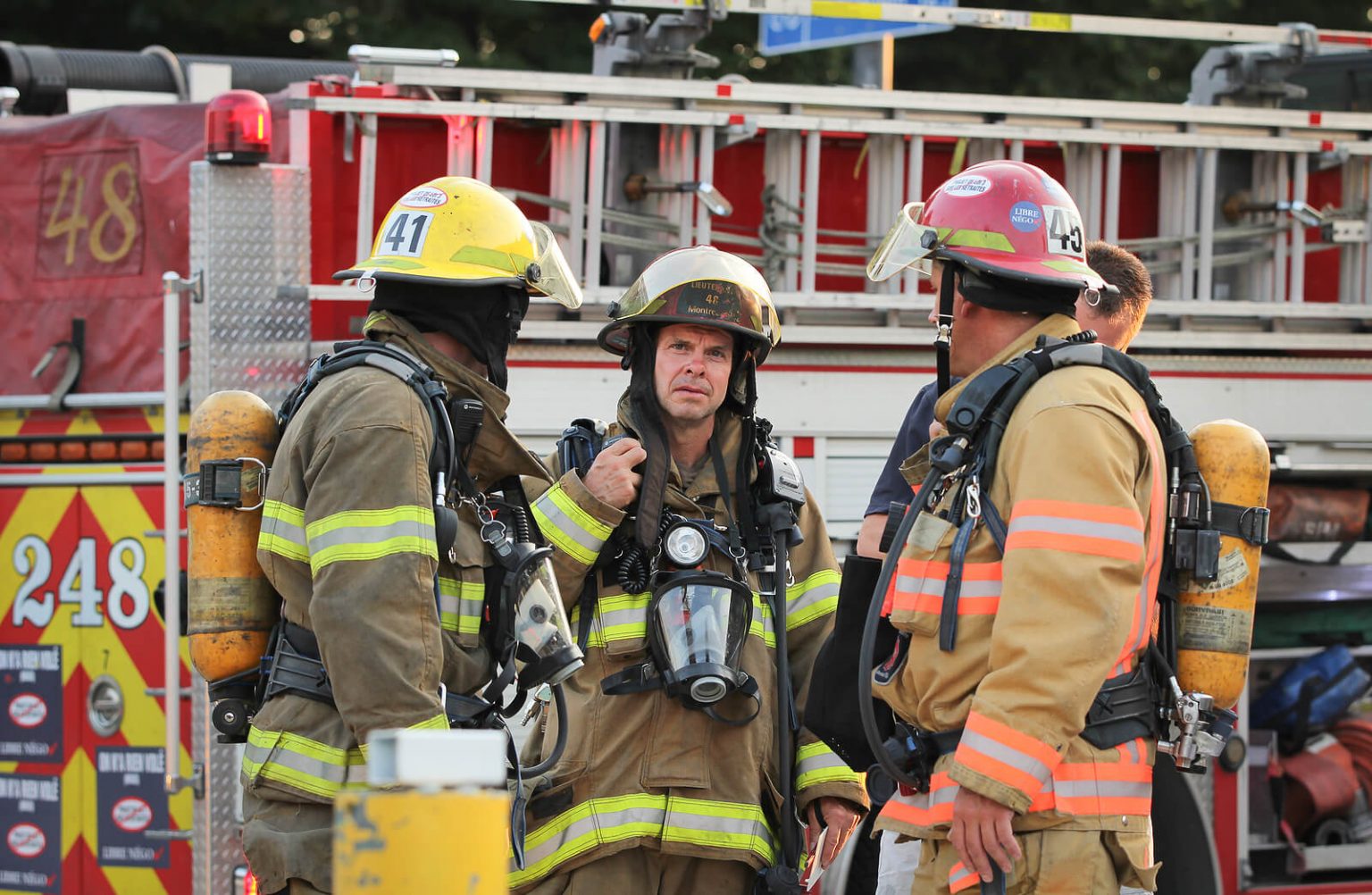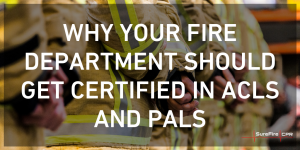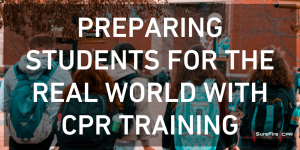Firefighting is a demanding job — but for some, the most grueling part comes before the turnout coat and bunker pants ever go on. The interview process is a hurdle that EVERY candidate must overcome if they are ever to be pinned with a Firefighter badge. Surprisingly, many candidates spend hours and even years obtaining additional certifications and work experience that they think will make the difference between being offered the job or not. The problem is, none of that experience matters if you’re not able to talk about it clearly and sell yourself in an interview.
Below, our expert emergency response instructors here at SureFire CPR offer 8 tips for passing any firefighter interview so you can land your dream job. Take notes, these tips could have you in the academy before you know it!
1.) How You Prepare for Your Interview Reflects What Kind of Firefighter You Will Be
When we are looking across the interview table at you we are asking ourselves a few very important questions: “How prepared are you? Are you personable? Are you humble?” and perhaps the most important question of all, “Would I want to work with you?” When you walk into the room we will be able to tell if you’ve prepared within the first few minutes. By reading this article you’re taking the first step in the right direction. Keep going. You need to do your research about the department you are interviewing with and yourself.
2.) How to Research the Fire Department
The majority of candidates will look on the fire department website and memorize some facts. They might know the mission statement, how many engines, trucks, and ambulances the department has, and possibly how many people it protects. They do the “research” from their phone or laptop and consider it done. How do you plan to separate yourself from the thousands of other candidates that are fighting for the same rookie position? You go the extra mile.
Call and schedule some station visits. Make an appointment, bring some homemade treats (cookies or brownies work well), and come prepared with a list of questions that you want to ask. Make them specific and something that you can’t research online. For example, “What do you like best about working for this department? What are some projects the department has planned for the future? What advice would you give someone like me who is trying to follow in your footsteps?” By getting this info and then weaving it into your own interview answers, you’ll show the interview panel that you’ve done your homework. This will always lead to higher scores. Another pro tip: schedule your station visits at the stations where the newest rookies are working. They will have the best info to help you succeed because they just accomplished your goal!
3.) How to Research Yourself

Researching yourself might sound weird, but it’s important to put together a list of experiences that you have so that you can show the interview panel that you can perform in high pressure situations and also be someone who won’t drive everyone crazy in the firehouse. You will use these experiences or “stories” to demonstrate how you’ve already done what the interviewers are asking. These experiences should be from a wide range of jobs, sports teams, volunteer events, etc. so you can show your diversity. Taking all of your stories from one job will not allow you to get the maximum amount of points. Here are some examples:
- How you have experienced diversity (both cultural and physical)
- How you have provided quality customer service
- How you have worked as part of a team
- A time that something did not go as planned and how you recovered
4.) Prep for the Most Common Firefighting Interview Questions:
The majority of your firefighting interviews will have a handful of “standard” questions. These are essentially free points, so you need to be ready for them. These questions need to be practiced to the point that they become second nature. Every time you get one of these questions you should celebrate inside because you know that you should get high scores on all of them!
- Tell me a little bit about yourself
- Why do you want to be a firefighter?
- What have you done to prepare for the job?
- Why do you want to work for (insert FD name here) Fire Department?
- What is customer service and how does it relate to the fire service?
- What is diversity and how does it relate to the fire service?
- What are the duties of a firefighter?
- What is your biggest strength and weakness?
- Closing question: Is there anything else you’d like to add?
You should write out the answers to these questions using the structure below and memorize them.
5.) Structure Your Answers Correctly:
Your answers should have the following structure if possible:
- Answer the question
- Tell how it relates to the fire service
- Share a short story about how you have already done it
For example: What is Diversity and how does it relate to the fire service?
Answer: “Diversity means variety or many different things. Diversity can be physical and cultural, and is extremely important to the fire service. As a firefighter I will be responding to a range of diverse calls. I could be on a cardiac arrest call in the morning, a brush fire in the (insert mountain range) mountains in the afternoon, and on a highrise fire on (insert street name of highrise buildings) at night.
Being able to respond to a wide variety of calls is what makes being a firefighter such an exciting career. Diversity also relates to the wide range of people and their backgrounds that we will respond to. Being aware of the cultural, physical, religious, and socioeconomic differences will allow us to provide the most complete care to the population that we are protecting.
Our diverse community is also reflected inside the firehouse, so understanding and respecting diversity is at the heart of everything firefighters do. Personally I’ve experienced diversity in my role as a CPR instructor at SureFire CPR. I’m responsible for teaching a wide range of topics to a very diverse student base. I could be teaching how to save a choking infant to a group of new moms in one class and teaching BLS to a group of doctors and nurses in the next. I’ve been fortunate to learn how to tailor my lesson plan so that it is most effective to the group that I’m teaching. I know these skills will serve me well if I’m given the chance to be a firefighter working in the diverse city of (insert city name).
6.) How to Answer Situational Interview Questions:
Firefighter situational interview questions are another common type of firefighting interview question. There is a special way to answer these ethical questions and they’ll be covered in our next guide! Until then, here are a few tips:
- Don’t assume the person is intentionally lying, stealing, cheating, etc.
- Get the facts
- Approach the person and ask them the hard question
- Offer to go with them to discuss the issue with their supervisor. If they refuse, tell them that you will be forced to take it up the chain of command without them.
7.) Do’s and Don’t – A quick guide
No interview prep guide on how to ace your firefighter interview would be complete without a short list of things to do and things to avoid. Here a few things to do if you expect to ace a firefighter interview.
- Do – Make sure you’re at least 30 minutes early
- Do – Dress the part. Your resume will be your first impression, your suit will be your second. Spend the money and get a suit that fits well and looks nice. Black, dark grey, or dark blue. Nothing fancy. You want them focusing on what you say, not your bright red vest.
- Do – Review the paperwork they gave you for the interview. Make sure you bring everything they ask for. Following instructions is part of your interview as well.
- Do – Always have something to add if they ask you, “Is there anything else you’d like to add?” End your interview on a high note, thank the panelists for their time, and offer them reassurance that if they give you a chance you won’t let them down.
- Don’t wear strong cologne, body spray, or perfume. Overwhelming body odor of any kind is a bad idea.
- Don’t forget to turn off your cell phone. Nothing says forgetfulness like a ringing cell phone during an interview. To be safe, turn it off before you enter the building.
- Don’t ramble on unrelated tangents if you get nervous. You can be detailed with your answers and keep things relevant at the same time. Boring your interviewer with incidentals shows a lack of focus.
- Don’t give up! If you feel like the interview is not going the way you want it to, stop and take a deep breath. Apologize, tell them that you’re nervous because this interview means so much to you. Regroup and start again.
8.) Practice, Practice, Practice!
Ultimately earning the badge of a firefighter is up to you. It takes time, effort, and determination to conquer the interview and move on to the background and psychological testing stages of the process. Follow the steps above and you will have a much better chance of accomplishing your dreams. Write out your answers, memorize them, and video yourself. You’ll be able to cut out the “ums” and awkward pauses. Most importantly, your practice will allow your personality to shine through the nervousness. What we want to see is your personality. If you know your answers backwards and forwards you will be less nervous and we’ll be able to see who you really are. Practice it yourself until you feel good about it and then try to schedule some mock interviews with friends or, better yet, other firefighters.
One final thought: Though you may not feel like it, the people sitting across the table from you during your interview want you to do well. We want you to succeed and ace the interview. Look at the interview as an amazing chance to fulfill your dreams, not an opportunity to make mistakes. You have nothing to lose and everything to gain!
Learn More and Get Certified With Us
Want more firefighting interview tips? Need to renew your BLS Certification? Want to add some advanced certifications to your resume like ECG and Pharmacology, ACLS (Advanced Cardiac Life Support), or PALS (Pediatric Advanced Life Support)? Our team here at SureFire CPR has you covered. Explore our site for more info on our award-winning certification courses, and contact us today! Or give us a call at (888) 277-3143







